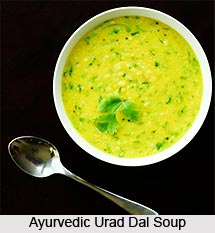 Ayurvedic urad dal soup is considered as a very healthy diet as it is loaded with innumerable nutritional benefits. This dal is one of the richest sources of proteins and Vitamin B. Urad dal is rich in fibre which makes this soup easy to digest. This soup is known to detoxify the body and also nourishes muscle, bone and reproductive fluids. Ayurvedic urad dal soup is easy to cook and can be made at home.
Ayurvedic urad dal soup is considered as a very healthy diet as it is loaded with innumerable nutritional benefits. This dal is one of the richest sources of proteins and Vitamin B. Urad dal is rich in fibre which makes this soup easy to digest. This soup is known to detoxify the body and also nourishes muscle, bone and reproductive fluids. Ayurvedic urad dal soup is easy to cook and can be made at home.
Ingredients of Ayurvedic Urad Dal Soup:
•Five cups of water
•One tablespoonful of safflower oil
•Two cups of urad dal
•One teaspoonful of black mustard seeds
•One teaspoonful of cumin seeds
•Four curry leaves
•One-fourth cup of fresh coriander leaves
•Two cloves of garlic well chopped
•One pinch of asafoetida
•One-fourth teaspoonful of salt
•One-fourth teaspoonful of turmeric
Method of Preparing Ayurvedic Urad Dal Soup:
•Wash the urad dal twice and then boil it in water until it becomes soft. Stir occasionally in between.
•Heat oil in a large pot over medium heat.
•Add the mustard seeds, cumin seeds and curry leaves and stir until the seeds start popping.
•Now lower the flame and add cilantro, garlic, chilli and hing.
•Cook until the garlic turns slightly brown in colour.
•Add the boiled dal to the spices followed by turmeric and salt. Boil it for some time and turn off the heat.
•Serve hot with rice and chapattis.
Benefits of Ayurvedic Urad Dal Soup:
•This Ayurvedic soup is an excellent, calming food for vata and vata-types can eat it frequently.
•This soup detoxifies the body.
•It nourishes muscle, bone and reproductive fluids.
•It aids in lactation and stimulates the body and soul.
•It is good for the heart.
•Regular intake of urad dal soup can reduce cholesterol and improve cardiovascular health.
•This soup is also good for women as it is enriched with iron, folic acid, calcium, magnesium, potassium which makes it a healthy pulse.
Caution about Ayurvedic Urad Dal Soup:
•People with kapha disorders should stay away from this soup.
•Avoid eating this soup with fish, yogurt or eggplant, because it makes a poor food combination that can cause toxins.




















